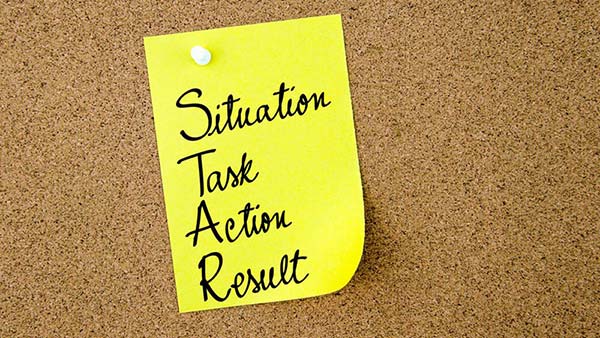
Failing to prepare and practice are perhaps the biggest – and most common – interview mistakes candidates make. That’s especially true when it comes to answering the dreaded behavioural questions. You know the ones, when they ask how you coped with a typical work situation.
If you want to avoid the usual awkward silence followed by panicked waffling, follow our advice.
Remember, the interviewer just wants to know what you’re like to work with. Many of their behavioural questions are highly predictable. One of the most common, for instance, is about teamwork. That should come as no surprise as it’s a critical skill from entry level upwards.
Four simple steps to interview success
As a graduate, you might not have a professional record that demonstrates your collaboration skills. Don’t worry. Give yourself the STAR treatment instead. Here’s how to prepare for the teamwork question – before the interview.
Start by making a list of all your team projects. Think about your teamwork in academic life, part time jobs, internships, sports, travel or any clubs or societies. Think of recent examples (taking part in your primary school play won’t wash).
Now use the STAR technique, below, to craft a short story. It needs a clear beginning, middle and end. Aim for about two minutes.
Situation – set the scene. Give a brief 10-second overview of the project. You want to get your role across quickly. But you don’t want to bore the interviewer with irrelevant detail.
Task – what were you setting out to do? Again, keep it brief – 10 seconds.
Action – this is your chance to shine, so take about 60-70 seconds. Focus on your strengths. What did you do? Describe key problems or conflicts you resolved. What resources did you use? Give examples of the skills you used to make a difference.
Result – Use your final 10 seconds to end on one key positive result. Try to make it relevant to the job if possible. Did you show strong communications, sales or negotiating skills? Did you demonstrate stamina or grit? Relate it back to the question; did you bring the team along with you?
Prepare a few examples using this technique. You need to be ready to answer a general “give me an example” question. You should also prepare for more specific questions such as “When has teamwork improved your work?” or “Do you prefer working on your own or in a team?”
Remember, the interviewer could ask you about a challenging scenario. For instance, “Have you ever had to deal with a reluctant team member?” This is where you need to turn a negative situation into a positive learning point.
Did you discover that their reluctance was actually shyness or nerves? Did you resolve this by encouraging them to work in a smaller group? Don’t just describe the problem. Always show how you solved it in a positive manner.
Practice your answers and different scenarios a few times with a friend but without notes. You need a flexible story outline not a script to memorise. You’ll have to think fast to adapt it to the interview question.
Check out our video https://www.youtube.com/watch?v=6iVH0MozG7w for a great example of how to use STAR to deal with teamwork questions. Now think about how you can use STAR to prepare for other behavioural answers.
If you need more confidence boosting tips or specialist interview coaching, please contact us.
